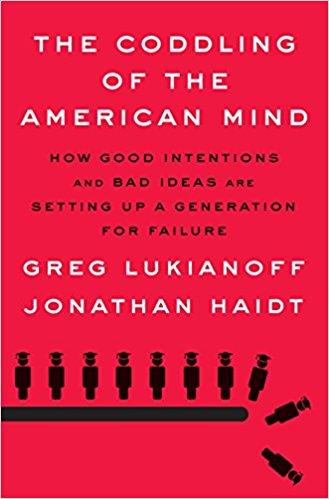The Coddling of the American Mind Summary

4 min read ⌚
 How Good Intentions and Bad Ideas Are Setting up a Generation for Failure
How Good Intentions and Bad Ideas Are Setting up a Generation for Failure
If you protect the students from seeing, hearing and speaking adverse things, the world will become a better place.
Or, will it?
Who Should Read “The Coddling of the American Mind”? And Why?
Today’s academic world becomes increasingly wary of “microaggressions.”
As a result, students are shielded from the real world, as professors have to use “trigger warnings.” to protect themselves when talking about topics that might cause distress.
Authors Greg Lukianoff and Jonathan Haidt study this trend and explain why it is not protecting the students, but on the contrary, it is harming them and disabling them to learning to cope with the different “shades” of life.
We recommend “The Coding of the American Mind” to all students, parents and university staff.
About Greg Lukianoff and Jonathan Haidt
 Greg Lukianoff is CEO of Foundation for Individual Rights in Education.
Greg Lukianoff is CEO of Foundation for Individual Rights in Education.
 Jonathan Haidt is a social psychologist and an ethical leadership professor at NYU-Stern School of Business.
Jonathan Haidt is a social psychologist and an ethical leadership professor at NYU-Stern School of Business.
“The Coddling of the American Mind Summary”
Some words are not as innocent as they sound.
This statement explains the term “microaggressions,” which we can define as seemingly innocent words and actions, that students may interpret and understand as a “kind of violence.”
Microaggressions are rapidly becoming an indivisible part of the standard university life in the United States.
Maybe even you have unknowingly become one of the micro-aggressors.
For instance, asking an Asian person where was he or she born is an example of microaggressions.
It does sound innocent, doesn’t it?
However, the foundation of such a question is an implication that the person is “not a real American.”
Responding to this trend, some professors give “trigger warnings” to their students, alerting them that some content they will talk about could “cause a strong emotional response.”
Students become increasingly wary as well. Some Harvard law students, for instance, ask the professors to skip teaching rape law since it might be upsetting for someone.
But is this “bubble” protecting students or is it, on the contrary, destroying them?
Protectiveness helps nobody.
Yes, it might make some information lighter to bear, but it does not prepare students for the real-life situations which they will have to face as they enter the “adult” and working world.
Additionally, it teaches young people to continually be distressed and to think of ways close to depression and anxiety.
Yes, you read right.
Studies show that in 2014, over 54% of college students had “felt overwhelming anxiety” in the past year.
Hence, if your professors and family are trying to protect you by leaving out “ugly” truths, they are misguided and are in no way doing you a favor.
We already know that people will most likely cure their fears if they face them straight on.
So, if someone is afraid of dogs, they should not avoid situations in which they encounter dogs. Avoidance will lead them to see dogs as dangerous all their life and make their everyday experience stressful and uneasy.
What such a person should do is to gradually start reintroducing dogs in their life – standing close by, petting them, and later maybe even playing with them.
If you don’t rewire your brain yourself, no one will do it for you.
Classrooms are one of the safest places in the world. And that is all great until students enter the workplace.
Workplaces are full of barriers and can be far less accommodating.
So, protecting students from ideas, people and words that may cause them some kind of emotional discomfort is only a momentary “solution.” But in the long run, it actually harms the students and their employers.
Colleges should focus on preparing people for the world in which there will be many things they cannot control, but they still need to learn how to live with it.
Besides, don’t you think that this “bubble” goes against the ideas of democracy?
Colleges need to promote free speech and talk openly about different issues. But for them to do that, the government must protect them legally, for saying things some students may not find likable.
Colleges should discourage professors from using trigger warnings and constantly sugar coating the truth.
Lastly, colleges have to encourage students to listen to ideas which are different from their own, and teach them that exposure to perceived ugliness is not dangerous.
Key Lessons from “The Coddling of the American Mind”
1. Microaggressions Definition
2. What the “Bubble” Actually Does to Students
3. Stop the Trigger Warnings
Microaggressions Definition
“Microaggressions” are seemingly innocent words and actions, that students may interpret and understand as a “kind of violence.”
What the “Bubble” Actually Does to Students
The new form of protectiveness might make some information lighter to bear, but it does not prepare students for the real-life situations which they will have to face as they enter the “adult” and working world.
Additionally, it teaches young people to continually be distressed and to think in ways close to depression and anxiety
Stop the Trigger Warnings
Colleges need to promote free speech and talk openly about different issues. But for them to do that, the government must protect them legally, for saying things some students may not find likable.
Colleges should discourage professors from using trigger warnings and continuously sugar coating the truth.
Like this summary? We’d Like to invite you to download our free 12 min app, for more amazing summaries and audiobooks.
“The Coddling of the American Mind” Quotes
What are we doing to our students if we encourage them to develop extra-thin skin just before they leave the cocoon of adult protection? Share on X The new climate is slowly being institutionalized and is affecting what can be said in the classroom, even as a basis for discussion or debate. Share on X According to the most basic tenets of psychology, helping people with anxiety disorders avoid the things they fear is misguided. Share on XOur Critical Review
“The Coding of the American Mind” is a piece of work produced by progressive thinkers, who strongly believe in the idea of free speech and actions.








